Sociology Report: Analysis of Aboriginal Health Policies in Australia
VerifiedAdded on 2022/11/16
|7
|1592
|312
Report
AI Summary
This report examines Australian social policies, specifically the Aboriginal and Torres Strait Islander Health Performance Framework, and its impact on the health and well-being of Indigenous Australians. It discusses the importance of social policies in addressing health disparities and improving the lives of Aboriginal and Torres Strait Islander communities. The report highlights the government's strategies, including funding allocations and specific initiatives aimed at reducing mortality rates, improving education and employment opportunities, and addressing cultural issues. The analysis covers the positive outcomes, such as improved child and maternal health, reduced tobacco intake, and the provision of specialist health services in various regions. The report concludes by emphasizing the Australian government's commitment to improving the quality of life for Aboriginal and Torres Strait Islander peoples through comprehensive policy implementation and ongoing monitoring of health outcomes. The report is supported by references to relevant literature and government publications.
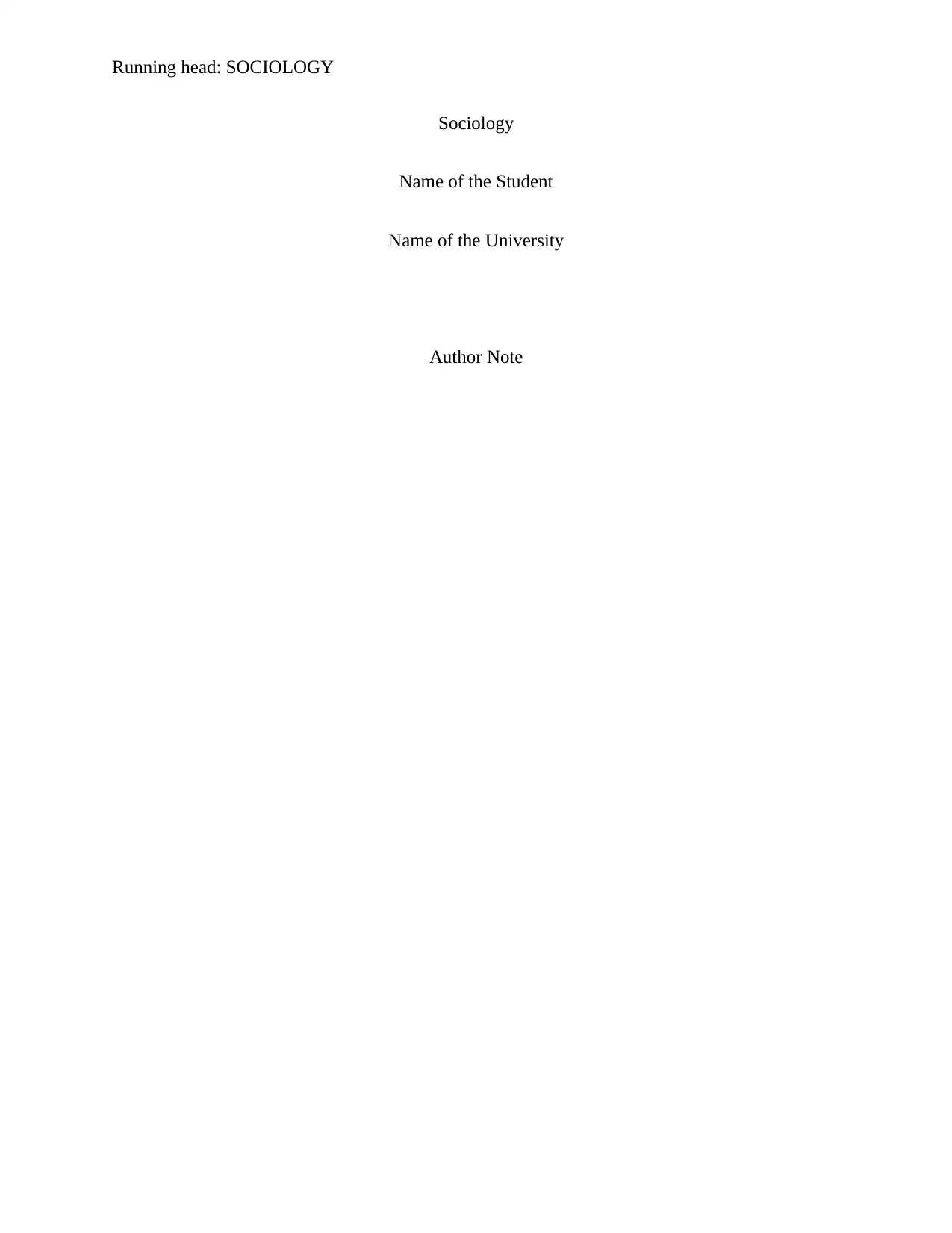
Running head: SOCIOLOGY
Sociology
Name of the Student
Name of the University
Author Note
Sociology
Name of the Student
Name of the University
Author Note
Paraphrase This Document
Need a fresh take? Get an instant paraphrase of this document with our AI Paraphraser
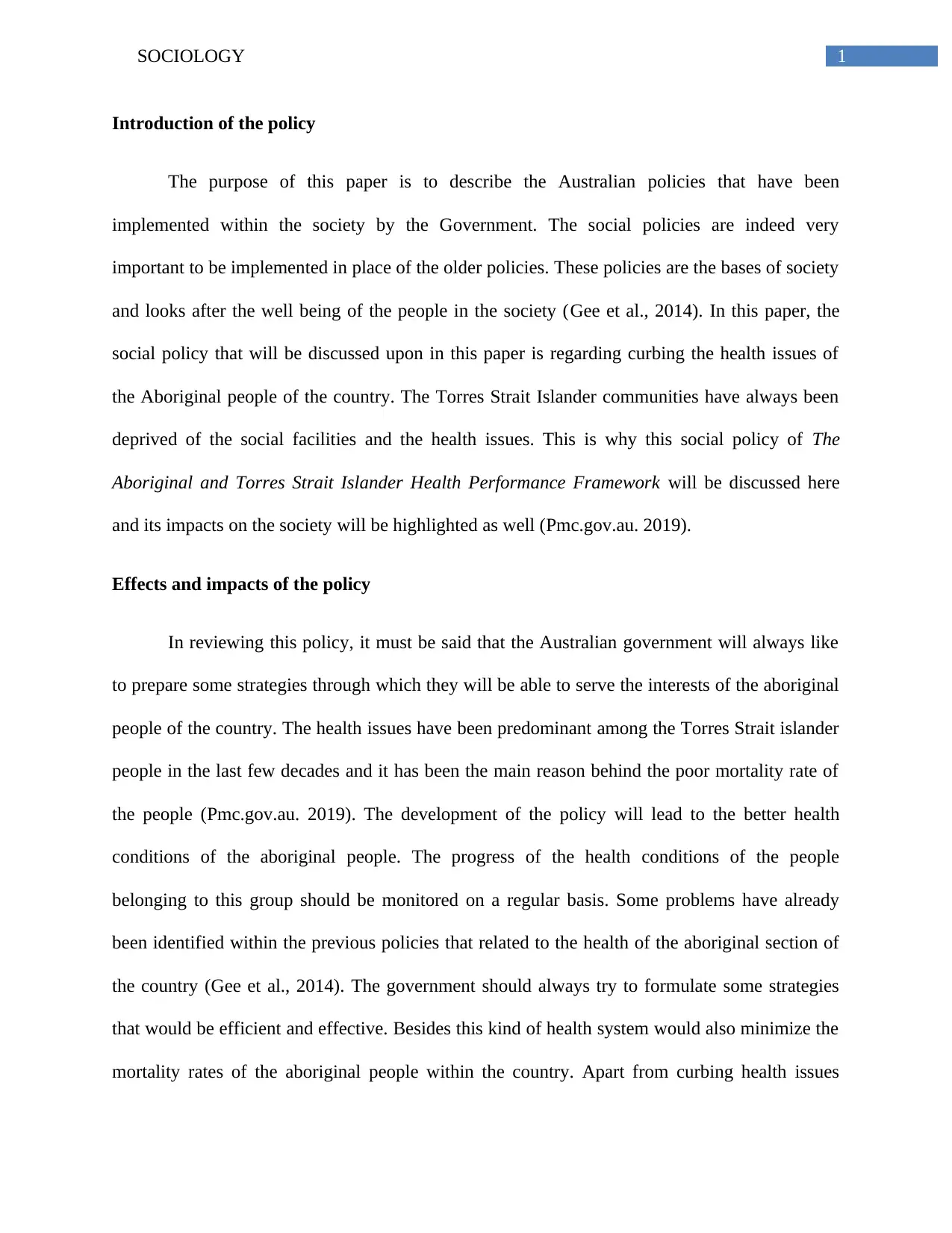
1SOCIOLOGY
Introduction of the policy
The purpose of this paper is to describe the Australian policies that have been
implemented within the society by the Government. The social policies are indeed very
important to be implemented in place of the older policies. These policies are the bases of society
and looks after the well being of the people in the society (Gee et al., 2014). In this paper, the
social policy that will be discussed upon in this paper is regarding curbing the health issues of
the Aboriginal people of the country. The Torres Strait Islander communities have always been
deprived of the social facilities and the health issues. This is why this social policy of The
Aboriginal and Torres Strait Islander Health Performance Framework will be discussed here
and its impacts on the society will be highlighted as well (Pmc.gov.au. 2019).
Effects and impacts of the policy
In reviewing this policy, it must be said that the Australian government will always like
to prepare some strategies through which they will be able to serve the interests of the aboriginal
people of the country. The health issues have been predominant among the Torres Strait islander
people in the last few decades and it has been the main reason behind the poor mortality rate of
the people (Pmc.gov.au. 2019). The development of the policy will lead to the better health
conditions of the aboriginal people. The progress of the health conditions of the people
belonging to this group should be monitored on a regular basis. Some problems have already
been identified within the previous policies that related to the health of the aboriginal section of
the country (Gee et al., 2014). The government should always try to formulate some strategies
that would be efficient and effective. Besides this kind of health system would also minimize the
mortality rates of the aboriginal people within the country. Apart from curbing health issues
Introduction of the policy
The purpose of this paper is to describe the Australian policies that have been
implemented within the society by the Government. The social policies are indeed very
important to be implemented in place of the older policies. These policies are the bases of society
and looks after the well being of the people in the society (Gee et al., 2014). In this paper, the
social policy that will be discussed upon in this paper is regarding curbing the health issues of
the Aboriginal people of the country. The Torres Strait Islander communities have always been
deprived of the social facilities and the health issues. This is why this social policy of The
Aboriginal and Torres Strait Islander Health Performance Framework will be discussed here
and its impacts on the society will be highlighted as well (Pmc.gov.au. 2019).
Effects and impacts of the policy
In reviewing this policy, it must be said that the Australian government will always like
to prepare some strategies through which they will be able to serve the interests of the aboriginal
people of the country. The health issues have been predominant among the Torres Strait islander
people in the last few decades and it has been the main reason behind the poor mortality rate of
the people (Pmc.gov.au. 2019). The development of the policy will lead to the better health
conditions of the aboriginal people. The progress of the health conditions of the people
belonging to this group should be monitored on a regular basis. Some problems have already
been identified within the previous policies that related to the health of the aboriginal section of
the country (Gee et al., 2014). The government should always try to formulate some strategies
that would be efficient and effective. Besides this kind of health system would also minimize the
mortality rates of the aboriginal people within the country. Apart from curbing health issues
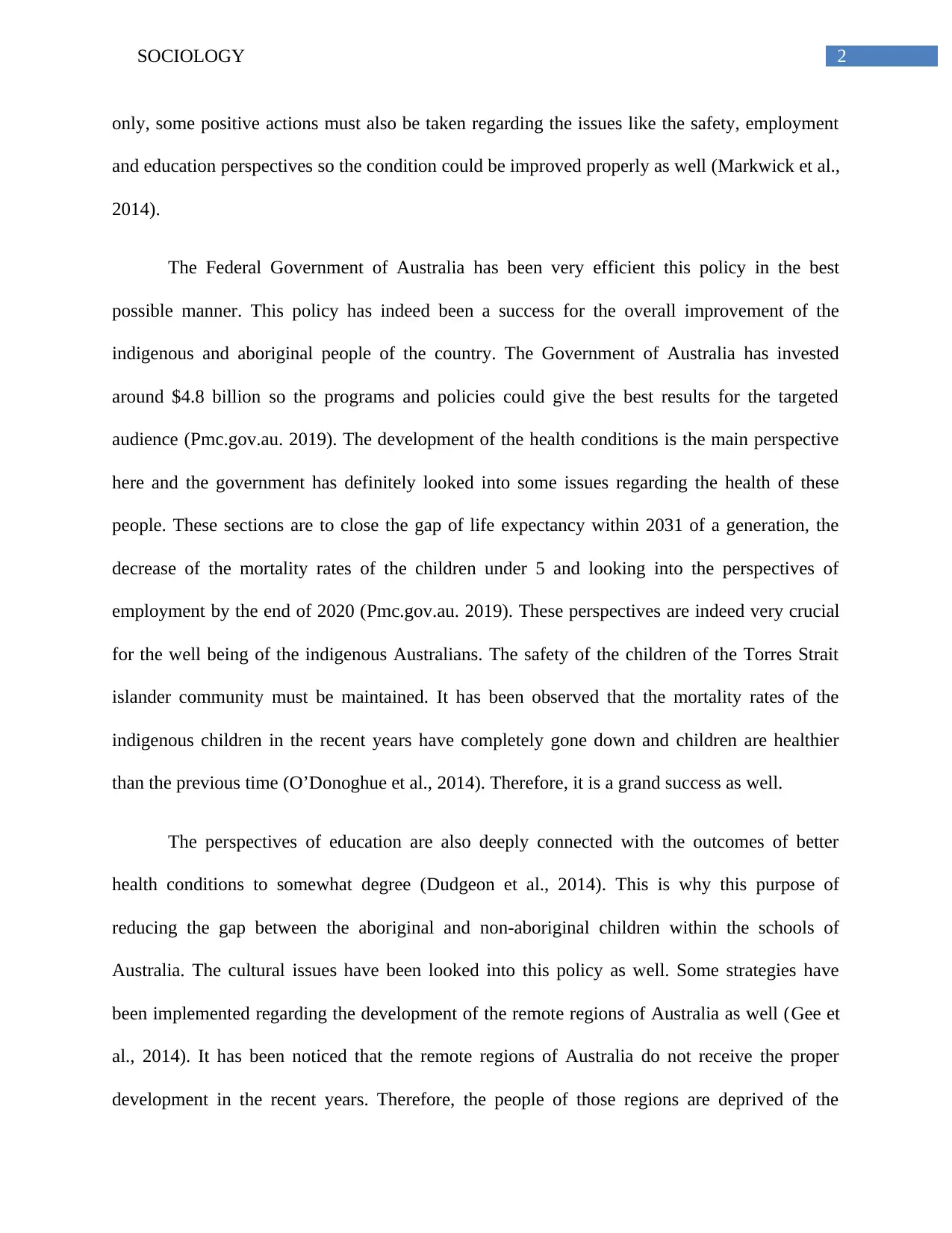
2SOCIOLOGY
only, some positive actions must also be taken regarding the issues like the safety, employment
and education perspectives so the condition could be improved properly as well (Markwick et al.,
2014).
The Federal Government of Australia has been very efficient this policy in the best
possible manner. This policy has indeed been a success for the overall improvement of the
indigenous and aboriginal people of the country. The Government of Australia has invested
around $4.8 billion so the programs and policies could give the best results for the targeted
audience (Pmc.gov.au. 2019). The development of the health conditions is the main perspective
here and the government has definitely looked into some issues regarding the health of these
people. These sections are to close the gap of life expectancy within 2031 of a generation, the
decrease of the mortality rates of the children under 5 and looking into the perspectives of
employment by the end of 2020 (Pmc.gov.au. 2019). These perspectives are indeed very crucial
for the well being of the indigenous Australians. The safety of the children of the Torres Strait
islander community must be maintained. It has been observed that the mortality rates of the
indigenous children in the recent years have completely gone down and children are healthier
than the previous time (O’Donoghue et al., 2014). Therefore, it is a grand success as well.
The perspectives of education are also deeply connected with the outcomes of better
health conditions to somewhat degree (Dudgeon et al., 2014). This is why this purpose of
reducing the gap between the aboriginal and non-aboriginal children within the schools of
Australia. The cultural issues have been looked into this policy as well. Some strategies have
been implemented regarding the development of the remote regions of Australia as well (Gee et
al., 2014). It has been noticed that the remote regions of Australia do not receive the proper
development in the recent years. Therefore, the people of those regions are deprived of the
only, some positive actions must also be taken regarding the issues like the safety, employment
and education perspectives so the condition could be improved properly as well (Markwick et al.,
2014).
The Federal Government of Australia has been very efficient this policy in the best
possible manner. This policy has indeed been a success for the overall improvement of the
indigenous and aboriginal people of the country. The Government of Australia has invested
around $4.8 billion so the programs and policies could give the best results for the targeted
audience (Pmc.gov.au. 2019). The development of the health conditions is the main perspective
here and the government has definitely looked into some issues regarding the health of these
people. These sections are to close the gap of life expectancy within 2031 of a generation, the
decrease of the mortality rates of the children under 5 and looking into the perspectives of
employment by the end of 2020 (Pmc.gov.au. 2019). These perspectives are indeed very crucial
for the well being of the indigenous Australians. The safety of the children of the Torres Strait
islander community must be maintained. It has been observed that the mortality rates of the
indigenous children in the recent years have completely gone down and children are healthier
than the previous time (O’Donoghue et al., 2014). Therefore, it is a grand success as well.
The perspectives of education are also deeply connected with the outcomes of better
health conditions to somewhat degree (Dudgeon et al., 2014). This is why this purpose of
reducing the gap between the aboriginal and non-aboriginal children within the schools of
Australia. The cultural issues have been looked into this policy as well. Some strategies have
been implemented regarding the development of the remote regions of Australia as well (Gee et
al., 2014). It has been noticed that the remote regions of Australia do not receive the proper
development in the recent years. Therefore, the people of those regions are deprived of the
⊘ This is a preview!⊘
Do you want full access?
Subscribe today to unlock all pages.

Trusted by 1+ million students worldwide
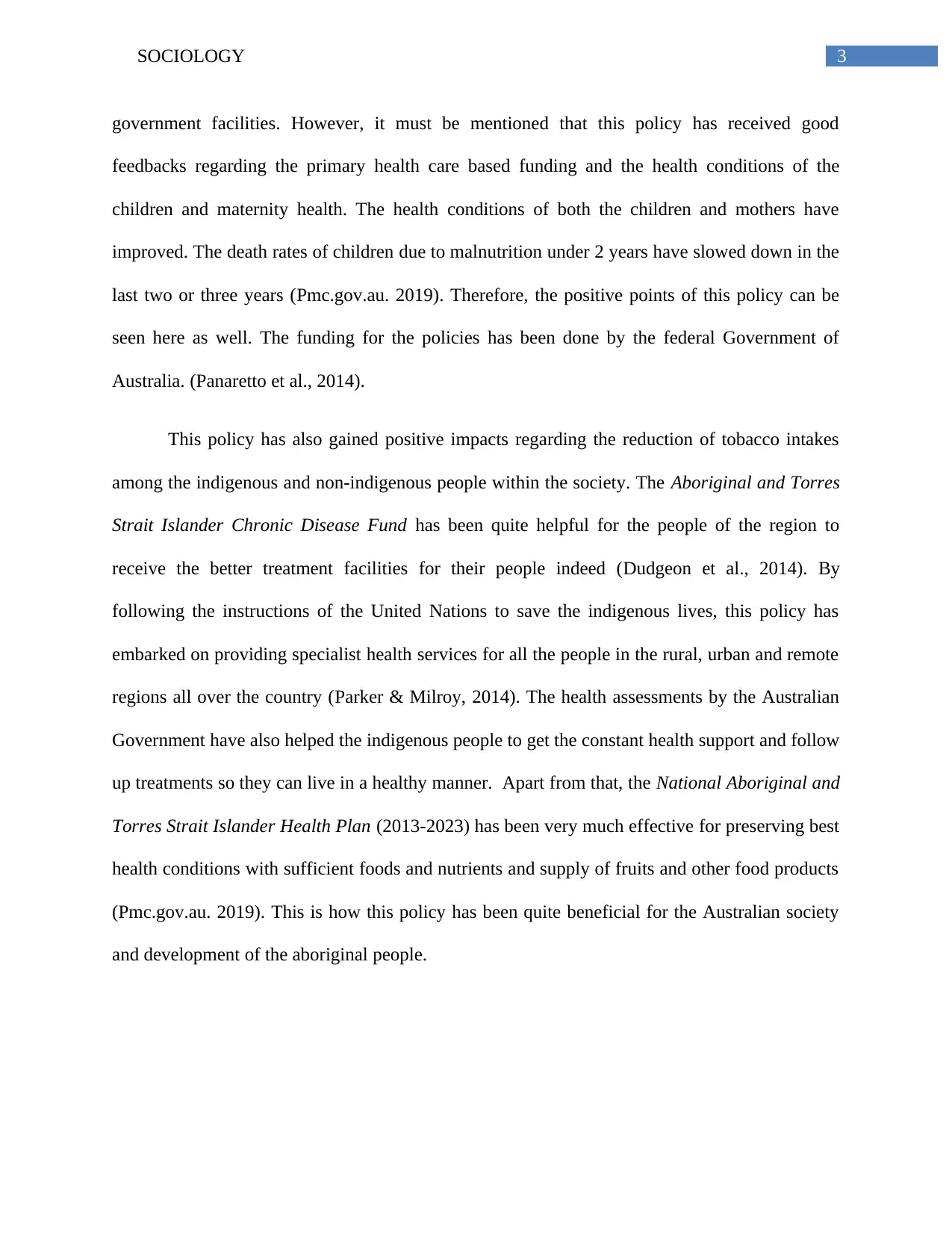
3SOCIOLOGY
government facilities. However, it must be mentioned that this policy has received good
feedbacks regarding the primary health care based funding and the health conditions of the
children and maternity health. The health conditions of both the children and mothers have
improved. The death rates of children due to malnutrition under 2 years have slowed down in the
last two or three years (Pmc.gov.au. 2019). Therefore, the positive points of this policy can be
seen here as well. The funding for the policies has been done by the federal Government of
Australia. (Panaretto et al., 2014).
This policy has also gained positive impacts regarding the reduction of tobacco intakes
among the indigenous and non-indigenous people within the society. The Aboriginal and Torres
Strait Islander Chronic Disease Fund has been quite helpful for the people of the region to
receive the better treatment facilities for their people indeed (Dudgeon et al., 2014). By
following the instructions of the United Nations to save the indigenous lives, this policy has
embarked on providing specialist health services for all the people in the rural, urban and remote
regions all over the country (Parker & Milroy, 2014). The health assessments by the Australian
Government have also helped the indigenous people to get the constant health support and follow
up treatments so they can live in a healthy manner. Apart from that, the National Aboriginal and
Torres Strait Islander Health Plan (2013-2023) has been very much effective for preserving best
health conditions with sufficient foods and nutrients and supply of fruits and other food products
(Pmc.gov.au. 2019). This is how this policy has been quite beneficial for the Australian society
and development of the aboriginal people.
government facilities. However, it must be mentioned that this policy has received good
feedbacks regarding the primary health care based funding and the health conditions of the
children and maternity health. The health conditions of both the children and mothers have
improved. The death rates of children due to malnutrition under 2 years have slowed down in the
last two or three years (Pmc.gov.au. 2019). Therefore, the positive points of this policy can be
seen here as well. The funding for the policies has been done by the federal Government of
Australia. (Panaretto et al., 2014).
This policy has also gained positive impacts regarding the reduction of tobacco intakes
among the indigenous and non-indigenous people within the society. The Aboriginal and Torres
Strait Islander Chronic Disease Fund has been quite helpful for the people of the region to
receive the better treatment facilities for their people indeed (Dudgeon et al., 2014). By
following the instructions of the United Nations to save the indigenous lives, this policy has
embarked on providing specialist health services for all the people in the rural, urban and remote
regions all over the country (Parker & Milroy, 2014). The health assessments by the Australian
Government have also helped the indigenous people to get the constant health support and follow
up treatments so they can live in a healthy manner. Apart from that, the National Aboriginal and
Torres Strait Islander Health Plan (2013-2023) has been very much effective for preserving best
health conditions with sufficient foods and nutrients and supply of fruits and other food products
(Pmc.gov.au. 2019). This is how this policy has been quite beneficial for the Australian society
and development of the aboriginal people.
Paraphrase This Document
Need a fresh take? Get an instant paraphrase of this document with our AI Paraphraser
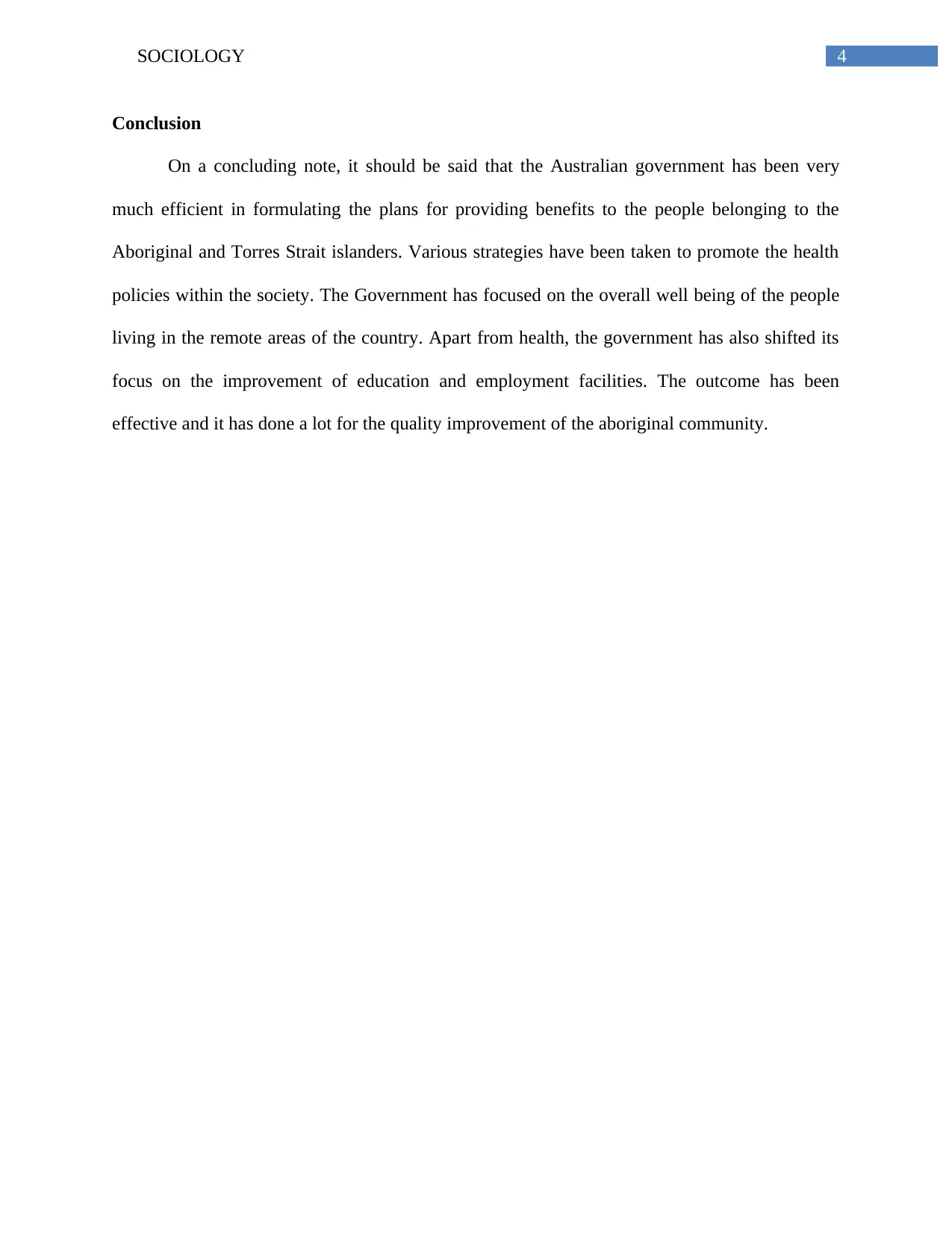
4SOCIOLOGY
Conclusion
On a concluding note, it should be said that the Australian government has been very
much efficient in formulating the plans for providing benefits to the people belonging to the
Aboriginal and Torres Strait islanders. Various strategies have been taken to promote the health
policies within the society. The Government has focused on the overall well being of the people
living in the remote areas of the country. Apart from health, the government has also shifted its
focus on the improvement of education and employment facilities. The outcome has been
effective and it has done a lot for the quality improvement of the aboriginal community.
Conclusion
On a concluding note, it should be said that the Australian government has been very
much efficient in formulating the plans for providing benefits to the people belonging to the
Aboriginal and Torres Strait islanders. Various strategies have been taken to promote the health
policies within the society. The Government has focused on the overall well being of the people
living in the remote areas of the country. Apart from health, the government has also shifted its
focus on the improvement of education and employment facilities. The outcome has been
effective and it has done a lot for the quality improvement of the aboriginal community.
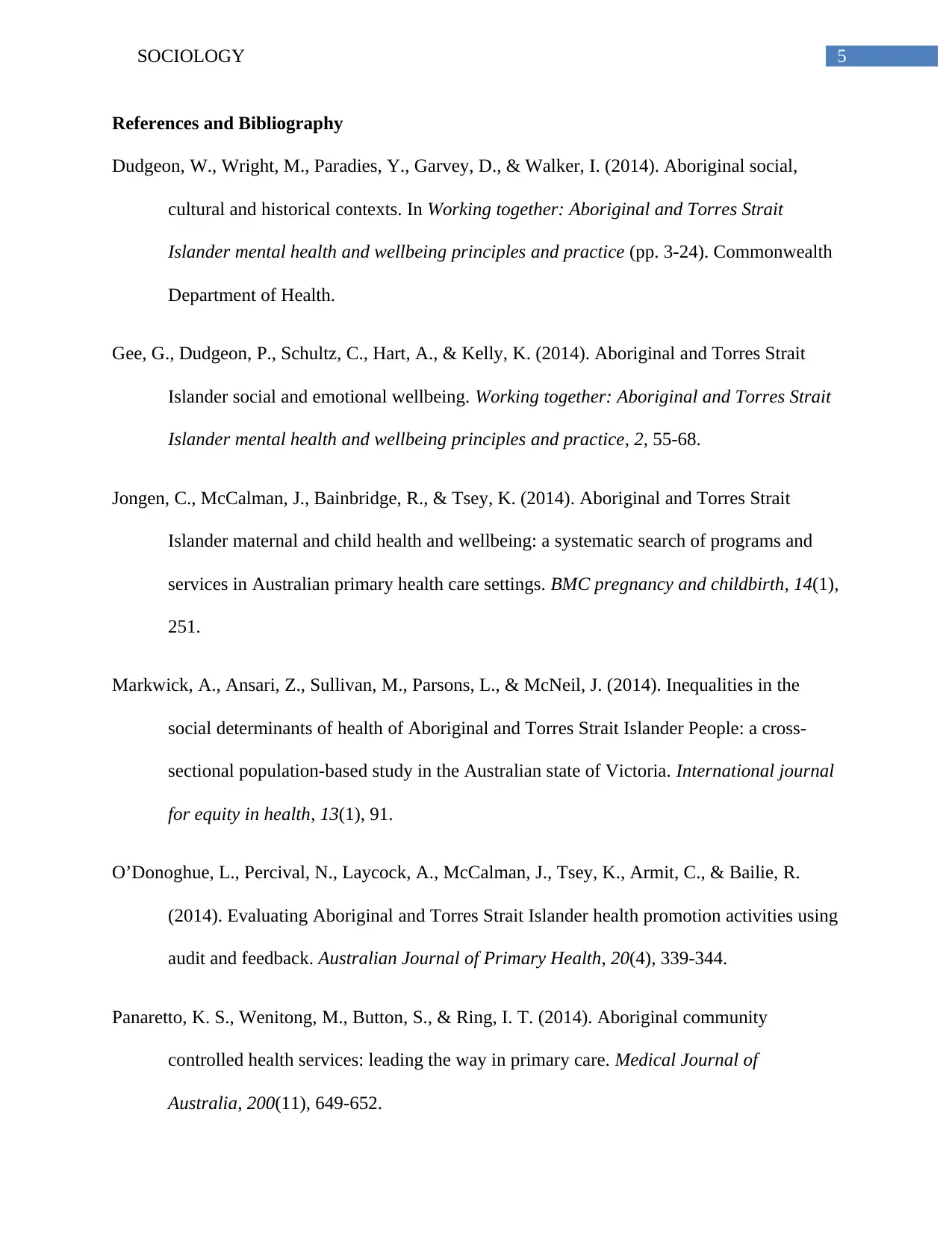
5SOCIOLOGY
References and Bibliography
Dudgeon, W., Wright, M., Paradies, Y., Garvey, D., & Walker, I. (2014). Aboriginal social,
cultural and historical contexts. In Working together: Aboriginal and Torres Strait
Islander mental health and wellbeing principles and practice (pp. 3-24). Commonwealth
Department of Health.
Gee, G., Dudgeon, P., Schultz, C., Hart, A., & Kelly, K. (2014). Aboriginal and Torres Strait
Islander social and emotional wellbeing. Working together: Aboriginal and Torres Strait
Islander mental health and wellbeing principles and practice, 2, 55-68.
Jongen, C., McCalman, J., Bainbridge, R., & Tsey, K. (2014). Aboriginal and Torres Strait
Islander maternal and child health and wellbeing: a systematic search of programs and
services in Australian primary health care settings. BMC pregnancy and childbirth, 14(1),
251.
Markwick, A., Ansari, Z., Sullivan, M., Parsons, L., & McNeil, J. (2014). Inequalities in the
social determinants of health of Aboriginal and Torres Strait Islander People: a cross-
sectional population-based study in the Australian state of Victoria. International journal
for equity in health, 13(1), 91.
O’Donoghue, L., Percival, N., Laycock, A., McCalman, J., Tsey, K., Armit, C., & Bailie, R.
(2014). Evaluating Aboriginal and Torres Strait Islander health promotion activities using
audit and feedback. Australian Journal of Primary Health, 20(4), 339-344.
Panaretto, K. S., Wenitong, M., Button, S., & Ring, I. T. (2014). Aboriginal community
controlled health services: leading the way in primary care. Medical Journal of
Australia, 200(11), 649-652.
References and Bibliography
Dudgeon, W., Wright, M., Paradies, Y., Garvey, D., & Walker, I. (2014). Aboriginal social,
cultural and historical contexts. In Working together: Aboriginal and Torres Strait
Islander mental health and wellbeing principles and practice (pp. 3-24). Commonwealth
Department of Health.
Gee, G., Dudgeon, P., Schultz, C., Hart, A., & Kelly, K. (2014). Aboriginal and Torres Strait
Islander social and emotional wellbeing. Working together: Aboriginal and Torres Strait
Islander mental health and wellbeing principles and practice, 2, 55-68.
Jongen, C., McCalman, J., Bainbridge, R., & Tsey, K. (2014). Aboriginal and Torres Strait
Islander maternal and child health and wellbeing: a systematic search of programs and
services in Australian primary health care settings. BMC pregnancy and childbirth, 14(1),
251.
Markwick, A., Ansari, Z., Sullivan, M., Parsons, L., & McNeil, J. (2014). Inequalities in the
social determinants of health of Aboriginal and Torres Strait Islander People: a cross-
sectional population-based study in the Australian state of Victoria. International journal
for equity in health, 13(1), 91.
O’Donoghue, L., Percival, N., Laycock, A., McCalman, J., Tsey, K., Armit, C., & Bailie, R.
(2014). Evaluating Aboriginal and Torres Strait Islander health promotion activities using
audit and feedback. Australian Journal of Primary Health, 20(4), 339-344.
Panaretto, K. S., Wenitong, M., Button, S., & Ring, I. T. (2014). Aboriginal community
controlled health services: leading the way in primary care. Medical Journal of
Australia, 200(11), 649-652.
⊘ This is a preview!⊘
Do you want full access?
Subscribe today to unlock all pages.

Trusted by 1+ million students worldwide
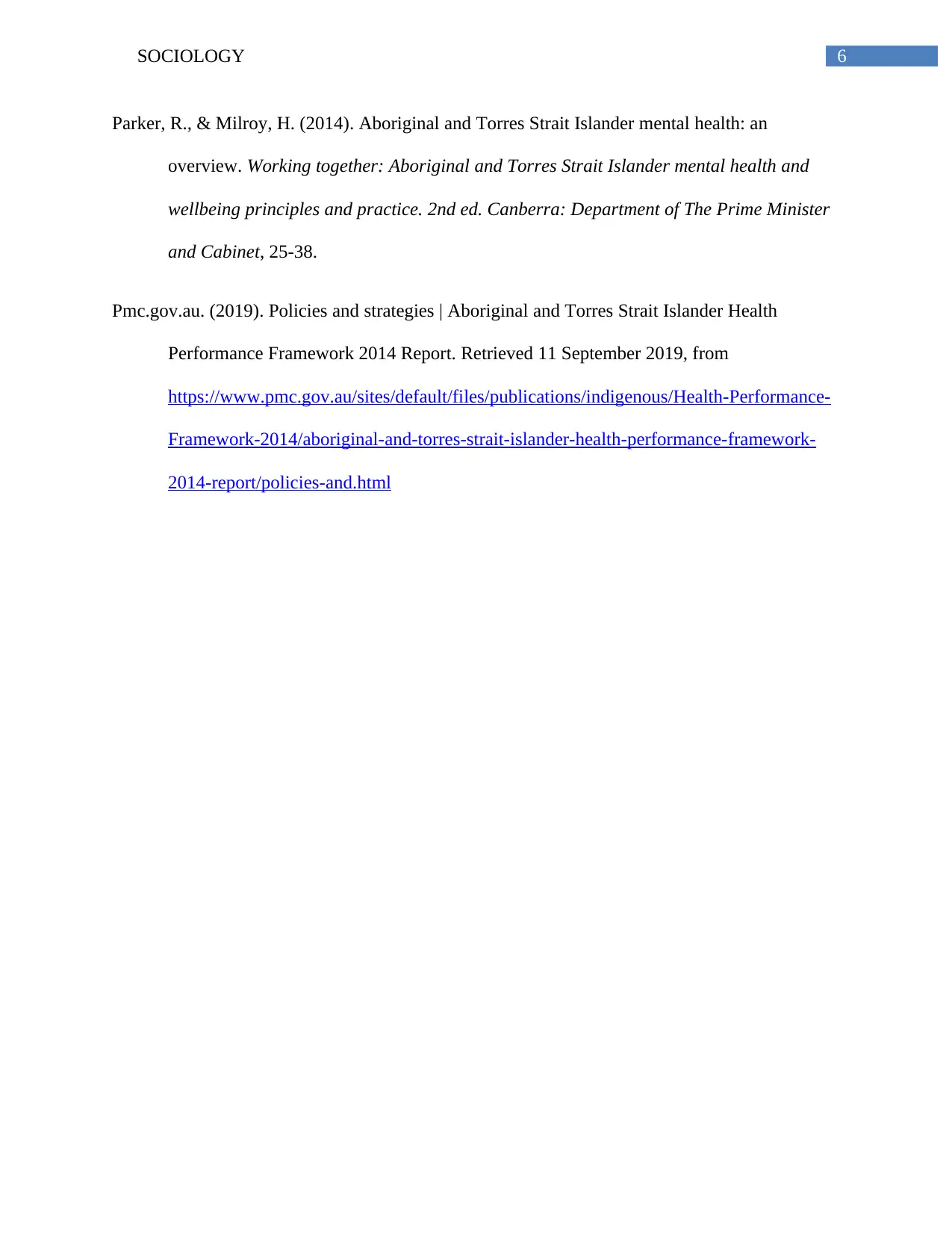
6SOCIOLOGY
Parker, R., & Milroy, H. (2014). Aboriginal and Torres Strait Islander mental health: an
overview. Working together: Aboriginal and Torres Strait Islander mental health and
wellbeing principles and practice. 2nd ed. Canberra: Department of The Prime Minister
and Cabinet, 25-38.
Pmc.gov.au. (2019). Policies and strategies | Aboriginal and Torres Strait Islander Health
Performance Framework 2014 Report. Retrieved 11 September 2019, from
https://www.pmc.gov.au/sites/default/files/publications/indigenous/Health-Performance-
Framework-2014/aboriginal-and-torres-strait-islander-health-performance-framework-
2014-report/policies-and.html
Parker, R., & Milroy, H. (2014). Aboriginal and Torres Strait Islander mental health: an
overview. Working together: Aboriginal and Torres Strait Islander mental health and
wellbeing principles and practice. 2nd ed. Canberra: Department of The Prime Minister
and Cabinet, 25-38.
Pmc.gov.au. (2019). Policies and strategies | Aboriginal and Torres Strait Islander Health
Performance Framework 2014 Report. Retrieved 11 September 2019, from
https://www.pmc.gov.au/sites/default/files/publications/indigenous/Health-Performance-
Framework-2014/aboriginal-and-torres-strait-islander-health-performance-framework-
2014-report/policies-and.html
1 out of 7
Related Documents
Your All-in-One AI-Powered Toolkit for Academic Success.
+13062052269
info@desklib.com
Available 24*7 on WhatsApp / Email
![[object Object]](/_next/static/media/star-bottom.7253800d.svg)
Unlock your academic potential
Copyright © 2020–2025 A2Z Services. All Rights Reserved. Developed and managed by ZUCOL.





